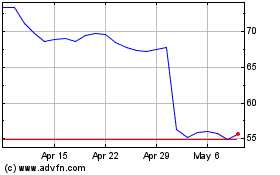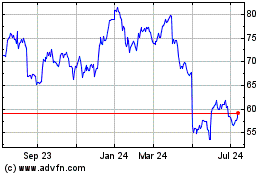By Brent Kendall
WASHINGTON -- A federal judge on Monday sharply questioned the
Justice Department's decision to green-light CVS Health Corp.'s
nearly $70 billion acquisition of Aetna Inc., and said he may order
CVS to halt its integration of Aetna's assets while he considers
the merger's implications.
It is highly unusual for a judge to make such an announcement,
since Justice Department antitrust enforcers had approved the deal
in October under the condition the companies sell Aetna's Medicare
drug business to preserve competition. The companies sold those
assets to WellCare Health Plans Inc.
When the Justice Department identifies concerns with a merger --
and reaches an agreement with the merging companies to address them
-- a federal law called the Tunney Act requires the government to
file the proposed settlement for approval by a federal court, which
determines whether the deal is in the public interest.
Such settlements are almost universally approved, often without
a judge calling a hearing. But U.S. District Judge Richard Leon --
who was a central figure in AT&T Inc.'s merger with Time Warner
Inc. -- made clear he would play an active role. He said at a terse
hearing Monday -- in which he sought no input from either the
Justice Department or the companies -- that he was concerned that
the department hadn't adequately addressed the potential
competitive harms raised by the merger.
"I am concerned that your complaint raises anticompetitive
concerns about one-tenth of 1% of this $69 billion deal," said the
judge, who sits on the U.S. District Court in Washington, D.C.
Judge Leon, whose courtroom style can be unorthodox, is looming
large over the current antitrust landscape. In June, he issued a
scathing opinion rejecting the Justice Department's challenge to
the AT&T-Time Warner deal. His ruling in that case is now on
appeal, with a high-stakes hearing set for Thursday.
In this case, the judge expressed, with equal vehemence, his
skepticism about the department declining to challenge the
CVS-Aetna merger more forcefully.
The judge's combined actions have left frustrations at the
Justice Department, with officials there finding his latest
position ironic in light of his rejection of the DOJ's AT&T
lawsuit challenging a merger, according to a person familiar with
their thinking.
Among other things, Judge Leon cited objections by the American
Medical Association, which argued the merger would substantially
reduce competition in health care to the detriment of patients. The
judge said he was eager to review other public comments on the
settlement before making up his mind.
Judge Leon, who was nominated to the court by President George
W. Bush, said he is considering requiring that CVS hold the Aetna
assets separate for now, which he said "seems to me more than
reasonable." If he does so, it could cause considerable disruption
for the newly merged company, since CVS began integrating Aetna's
assets immediately after the deal closed last week.
He ordered the companies and the Justice Department to file
legal papers by Dec. 14, and scheduled another court hearing for
Dec. 18.
A spokesman for the merged business said the two companies no
longer are separate entities, raising questions about how they
could disentangle themselves if the judge ordered it. "CVS Health
and Aetna are one company, and our focus is on transforming the
consumer health experience, " the spokesman said.
Judge Leon has made waves in antitrust settlements before.
During the Obama administration, he warned in 2011 that he might
not approve a Justice Department settlement that allowed Comcast
Corp. to acquire control of NBCUniversal.
The judge ultimately approved the agreement, but he chose to
hold annual oversight hearings and required the government to
report back on how many online-content companies used an
arbitration provision in the settlement.
Antitrust practitioners said they couldn't remember a judge ever
forcing substantial changes to a merger in a Tunney Act review.
James Tierney, a former Justice Department antitrust lawyer now
with the Orrick law firm, said the department and the companies
were handling the CVS-Aetna case in a traditional way. "What's
happening here is consistent with the Tunney Act and decades of
precedent," he said.
The act gives judges the authority to make sure that Justice
Department antitrust settlements address the harms the government
has identified, but it doesn't give courts free-roaming ability to
require the department to challenge other aspects of a merger the
department didn't find problematic, Mr. Tierney said.
The merger combines CVS's sprawling network of pharmacies and
its pharmacy-benefit manager business with Aetna's health insurance
practices focused on employers, Medicare and Medicaid managed-care.
The companies argued that the vertical integration of their
businesses would lead to better integrated, more efficient care for
consumers.
In an earlier court session last week, Judge Leon appeared
surprised that the companies had already closed the merger and said
he wouldn't be a "rubber stamp" for the settlement.
Merging parties normally begin integrating their units after
receiving government antitrust approval, without waiting for a
court to formally sign off.
Over the weekend, the Justice Department filed court papers
arguing that Judge Leon had a limited role in the matter, with no
authority to raise objections that the government hadn't. And it
said the judge already had signed a preliminary order that
effectively allowed the companies to move forward on their
merger.
Justice Department lawyers -- including antitrust chief Makan
Delrahim -- turned out in large numbers for Monday's hearing,
filling two rows of the courtroom.
Judge Leon addressed the government contingent, saying he did
have authority to ensure that the Justice Department hadn't settled
the case so narrowly as to make a "mockery" of the judicial system.
He spoke for less than 10 minutes without hearing from either the
department or CVS, then adjourned the session.
Mr. Delrahim, upon exiting, declined to comment.
Write to Brent Kendall at brent.kendall@wsj.com
(END) Dow Jones Newswires
December 03, 2018 19:33 ET (00:33 GMT)
Copyright (c) 2018 Dow Jones & Company, Inc.
CVS Health (NYSE:CVS)
Historical Stock Chart
From Mar 2024 to Apr 2024

CVS Health (NYSE:CVS)
Historical Stock Chart
From Apr 2023 to Apr 2024
